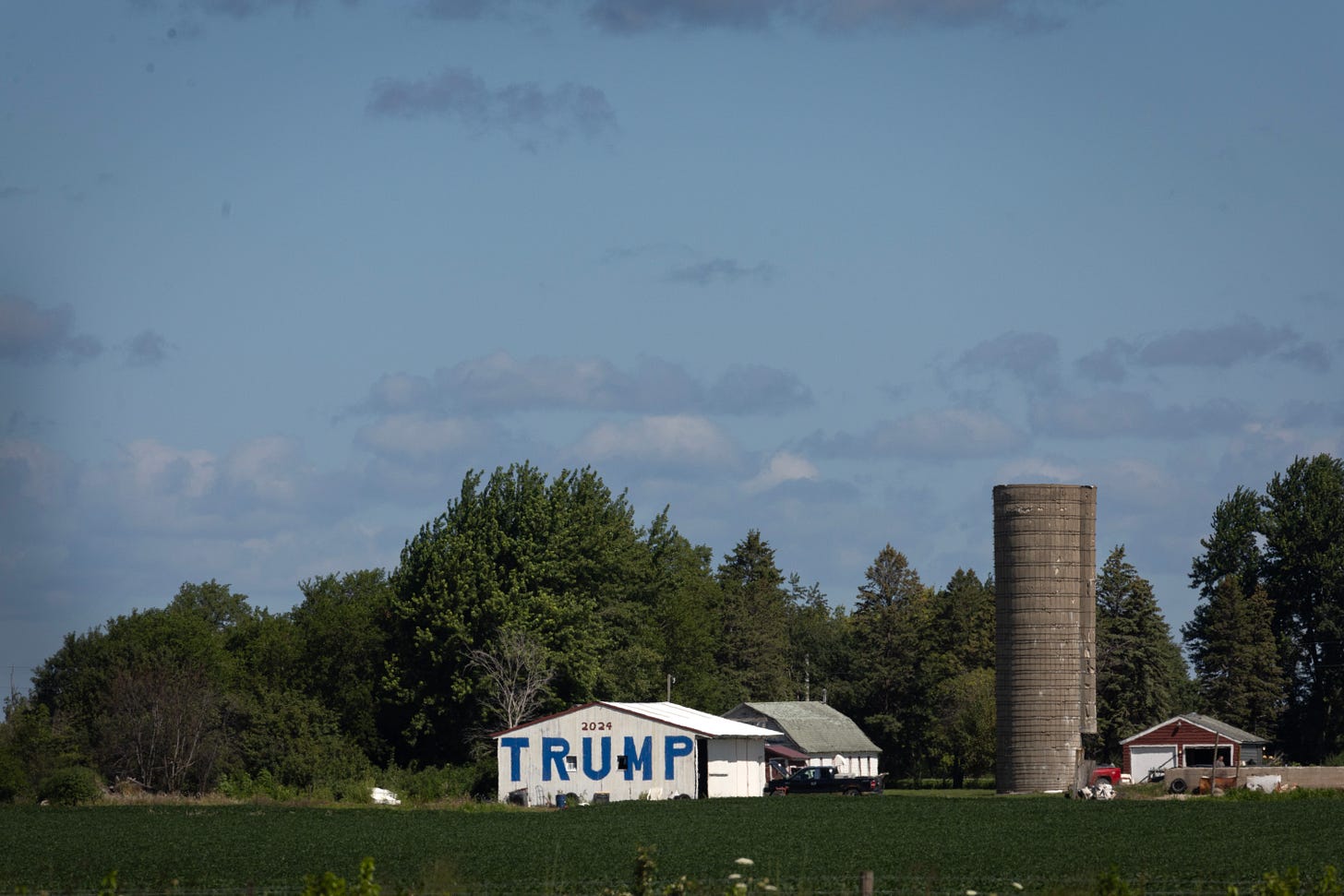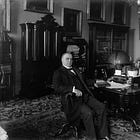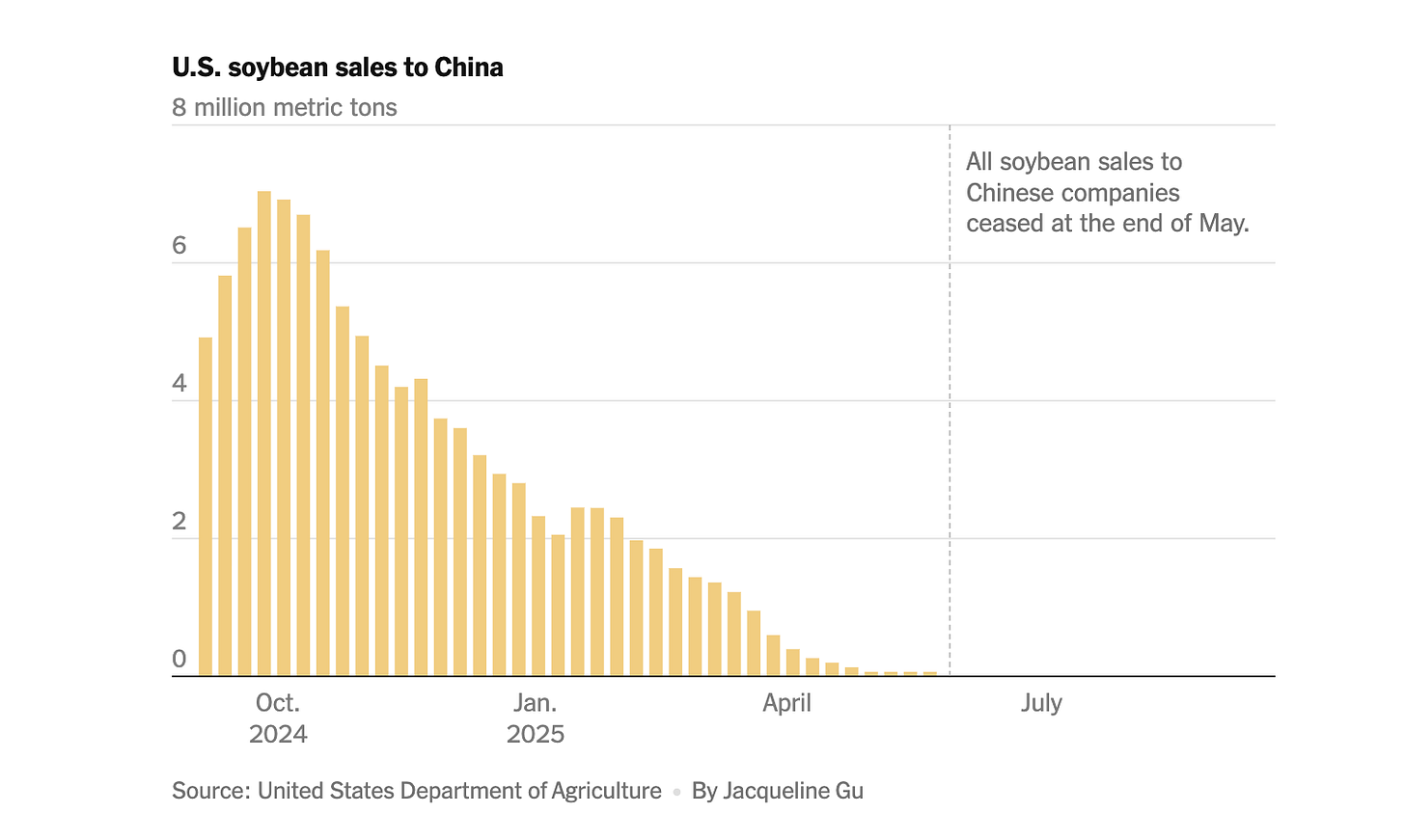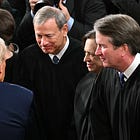Get ready for the next big bailout
Trump's tariffs are wrecking the agribusiness economy — again.
PN is supported by paid subscribers. Become one ⬇️
When the Great Recession hit in 2008 and Americans stopped buying cars, it soon became clear that the auto companies might well go out of business. The millions of jobs that would’ve been lost and the terrible blow to the American economy were considered intolerable, so the government bailed the industry out to the tune of almost $80 billion.
It was hugely controversial at the time; you might remember Mitt Romney’s famous “Let Detroit Go Bankrupt” op-ed, which he never quite lived down. But what few Americans probably know is that there was a bailout almost as big during Donald Trump’s first term. The difference was that Trump’s bailout was entirely predictable and entirely avoidable. And now he’s about to do it all over again.
In this case, the ones being bailed out are farmers.
Farmers like to think of themselves as independent and self-sufficient, which in some ways they are. But they’re also dependent on the largesse of the American taxpayer — if you’re looking for the real “welfare queens,” farm country is where they can be found.
There are 400 federal programs aimed at rural America, and every five years (give or take), Congress passes “the farm bill,” a behemoth of subsidies, price supports, loan programs, development programs, government purchases, and a whole lot more. The 2018 version ran over 500 pages and spent $867 billion.
Most of us think that, generally speaking, that’s fine. We may not know much about all those programs, but we’re okay with the government subsidizing the nation’s food production. Urbanites are not protesting with signs reading “Let the farms go bankrupt!” We all have a role to play in the functioning of the economy, and farmers play an important one.
But what Trump is doing is especially dumb, and like so much of what’s wrong with his economic policies, it starts with tariffs.
Last week, Trump made clear that there’s a big farm bailout coming.
“We’re going to take some of that tariff money that we made, we’re going to give it to our farmers, who are, for a little while, going to be hurt until the tariffs kick in to their benefit,” he said. “So we’re going to make sure that our farmers are in great shape, because we’re taking in a lot of money.”
If you thought the tariff story was just about higher prices for consumers and damage to American businesses, you might have said Well, at least we’ll be able to use tariff revenue for something useful. Apparently not.
Just as he did in his first term, Trump seems to be implementing the following brilliant economic strategy. First, impose tariffs on foreign goods, knowing that other countries (especially China) will retaliate by no longer importing American agricultural products. Next, take the revenue raised by tariffs — which are essentially a sales tax imposed at ports of entry — and hand the money to the farmers who were harmed by his trade war.
What that means is that the farmers will be insulated at least somewhat from the damage Trump’s foolish trade war did to them; in other words, they’ll get a bailout. The rest of us will pay for it. And the economy will get no benefit at all.
The definition of insanity
To anyone who paid attention to tariff policies in Trump’s first term, this has a familiar ring.
Back then, Trump imposed tariffs on a variety of Chinese goods, and China retaliated with its own tariffs on American agricultural products. The result was that American ag exports to China fell off a cliff, and the farm sector came to the Trump administration demanding relief. Which they got: By the fall of 2020, Trump had authorized $61 billion in bailouts to farmers to make up for the lost revenue in exports to China. Which just happened to be almost the entire value of tariffs raised on incoming Chinese goods.
And unlike the $80 billion we spent on the auto bailout — of which $70 billion was repaid, meaning it didn’t cost much in the end — the farm bailout money was needlessly flushed down the drain. Instead of China paying for American products, the American taxpayer ponied up to keep farmers afloat.
Now here we are again. Trump imposed sweeping tariffs on China, and China responded with retaliatory tariffs on American crops and started importing from elsewhere. Last year, China bought $12.6 billion worth of American soybeans, our biggest agricultural export; now they’re buying none.
Anyone with half a brain knew this is exactly what would happen, but remarkably, “anyone with half a brain” doesn’t seem to include the people making economic policy in the Trump administration. Politico reports that “a person close to the administration said it was ‘ruffled’ and ‘completely caught off guard,’ by the outcry from soybean farmers warning of the potential for financial ruin.”
How on earth could they be caught off guard? Of course China was going to impose retaliatory tariffs, and of course they’d shift their purchases of soybeans from the US to Brazil, the world’s largest producer. We already went through this five years ago.
Now Trump says he’ll do another bailout for farmers, “until the tariffs kick in to their benefit.”
And when will we see this remarkable moment when tariffs “kick in” to the benefit of farmers? How is that supposed to work? If you’re talking about, say, a tariff raising prices on a particular manufactured good that allows American manufacturers of that same good to compete on price until they can develop their industry, there’s at least a logic there. But that’s not what’s happening in the farm sector.
It isn’t like our farmers aren’t producing enough crops and need help in order to get production going again. The US produces a huge amount of food, more than we need here at home. But farmers need to have somewhere to sell it.
The pointless chaos of Trump’s economic policy
Trump sold his tariff policy as the key to creating a new “golden age” for the American economy. Instead, we’ve gotten slower job growth, rising prices, and no evidence that tariffs have produced any benefit at all.
While tariff revenue has indeed increased, that money didn’t fall from the sky and it wasn’t paid by other countries; it’s a tax on American consumers and businesses. And even if the tariffs haven’t yet caused the inflationary spike many feared, it could still be on its way as businesses run out of the goods they stockpiled before the tariffs kicked in and can no longer absorb the higher prices they’re paying for imports of finished goods, parts, and raw materials.
There’s no reason, furthermore, to think that Trump’s tariff policy will get any more reasonable over the next three years, no matter what happens. Almost every day sees the announcement of a new tariff on someone Trump is mad at; yesterday he proclaimed on Truth Social that “I will be imposing a 100% tariff on any and all movies that are made outside of the United States.” Does that mean you will have to pay $30 for a ticket to the next James Bond movie instead of $15? Nobody knows, because no one has thought any of it through, least of all Trump himself.
There’s one more element to this story. The president’s power to impose tariffs unilaterally is actually quite limited; they are supposed to be the purview of Congress. A 1977 law called the International Emergency Economic Powers Act gives the president the ability to impose tariffs on his own in the case of an emergency, but there is no plausible argument that “we buy too much stuff from China” is the kind of emergency envisioned by the law.
Which is why a month ago, an appeals court struck down Trump’s tariffs, but allowed them to stay in place while he appealed to the Supreme Court. On November 5, the High Court will hear oral arguments in the case; with characteristic Trump administration restraint, the solicitor general wrote to the Court that “the tariffs are promoting peace and unprecedented economic prosperity, and that the denial of tariff authority would expose our nation to trade retaliation without effective defenses and thrust America back to the brink of economic catastrophe.”
Given how eager the Court’s six conservatives have been to grant Trump almost every expansion of presidential power he’s asked for, it may be hard to imagine them not ruling in his favor, regardless of what the law says. But just in case, the administration has been expanding its use of a separate national security rationale for sweeping tariffs; addressing those would take another set of lawsuits, starting the legal challenges all over again.
So for the moment, it looks like the tariffs will continue to do their damage, all based on Trump’s deranged belief in the fantasy that, as he said years ago, “trade wars are good, and easy to win.”
If your CEO is smart enough to suck up to Trump by giving him a plaque with a 24-carat gold base, you can get an exemption from the tariffs. If you’re a farmer — that is, part of a group Trump sees as loyal supporters — you might be lucky enough to get a taxpayer-funded bailout. But if you’re one of the other losers — a group that includes almost all of us — you’ll be the one paying.
That’s it for today
We’ll be back with more tomorrow. If you appreciate today’s PN, please do your part to keep us free by signing up for a paid subscription.
Thanks for reading, and for your support.








If the Democrats had any sense they'd be heavily publicizing just how much of the extra money earne in tarrifs will be spent on needlessly (it should never have been necessary) compensating farmers affected by utterly predictable retaliatory actions. I'd be very surprised if soybeans were the only industry affected.
As I was reading this article about Drumpf's irrational and idiotic obsession with tariffs, the thought occurred to me that is addressed later in the piece: he has no right to impose them. That's the job of Congress although the MAGAts remain compliant and dutifully submissive to the mad king's every whim. As we mourn the 1 week anniversary of the shameful rantings of the lunatic during his UN visit last Tuesday, our allies must look at the US with utter and complete bewilderment that the former leader of the free world (America) has gone stark raving mad. Alas, tis true.